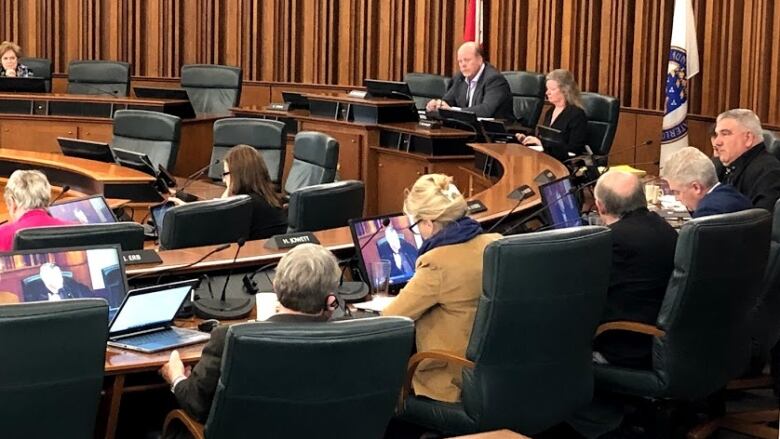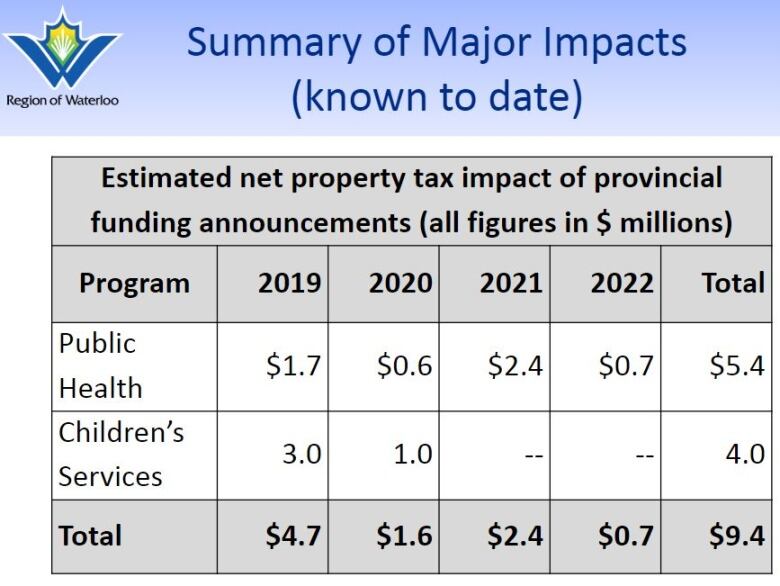Provincial budget change will cost region $9.4M by 2022, staff project
Ontario budget creates significant and immediate challenges for region, staff report says

The Region of Waterloo will have to cover an extra $9.4 million in costs in the next three years after the province made budget changes.
At least, that's what the region knows of so far, says Craig Dyer, commissioner of corporate services and chief financial officer.
In a presentation to the region's administration and finance committee Tuesday afternoon, Dyer said his report on what impact the provincial budget will have on the region was a list of "here's what we know right now based on very little information."
He noted there will be more announcements in the coming weeks, but in his report Tuesdayhe focused on three main areas: housing, public health and child care.
Housing funding a 'small bit of good news'
Dyer noted there was a minor change to funding for Community Housing Prevention Initiative with the region receiving a little less money than expected for 2019: about $300,000 below what was budgeted.
He said staff should be able to adjust their spending to deal with that decrease in funding. He saidthose options are currently being looked into.
The province did announce two new programs: the Canada-Ontario Community Housing Initiative and the Ontario Priorities Housing Initiatives. Dyer said staff aren't clear on how those projects will work, but it could mean about $3.3 million will be made available to the region.
Those new programs were the "small bit of good news" the region received budget, he said.
Public health to costmore
The province is changing how it will fund public health. Until now, it's been a 75/25 per cent split with the province paying the higher proportion. As well, there were some public health programs the province funded completely.
That's been shifted for this year, withmunicipalities having to cover 30 per cent of the cost of all programs including those they previously did not pay for.
That will change again in 2021 when it will become a 60/40 split, Dyer said.
In total, that's a $2.3 million funding impact to the region, Dyer said.
He added it's unclear how the region will be affected by the province decreasing the number of public health boards in the province from 35 to 10.
Children's services 'trickier to figure out'
The changes to children's services funding was a but "trickier to figure out," Dyer said.
It appears that where the province used to fund programs 100 per cent, now there will be an 80/20 split with municipalities taking on the smaller proportion of those costs.
As well, the province has decreased the amount the region can spend on administration costs for child care, down to five per cent from 10 per cent.
The changes will cost the region about $4 million between now and 2020, Dyer said.
But, he also stressed there arestill many unknowns in looking at budget estimates from the province.
"The impact may not be as high" as $4 million, but that number is based on their understanding of the province's current documents.

Impact on taxpayers
What does this mean for taxpayers? Regional Coun. Sean Strickland, who also chairs the administration and finance committee, says it may mean the region has to raise taxes and/or cut services.
"When you receive a significant reduction like we're anticipating from the provincial government and which we've seen so far, we have [few] toolsat our disposal to deal with them so it's either cut programs or raise taxes," he said. "I think at the end of the day, from the region's perspective, you're going to see both."
Dyer noted making the changes for this year is also tricky.
"Making these changes after 2019 municipal budgets, tax levies and tax rates have been set creates significant and immediate challenges for municipalities," he wrote in his report to the committee.
"Had the region been given notice that such changes would come into effect for the 2020 budget year, for example, staff and council would have been better able to plan for and communicate any resulting service and property tax implications."
When asked if regional staff havea sense of how the provincial budget will impact taxpayers, Dyer responded, "We absolutely don't have a sense of that just yet."
"That is part of what we need to work on in the coming weeks. We're still awaiting additional information from the various ministries so we can better understand what the options are," he added.
Stickland said he can understand the province needing to make changes, but those changes haven't beentransparent and municipalities are being surprised by them.
"It was basically buried within their budget bill," he said. "We are flying a little bit blindly here because there are additional cuts that are to come, they've already indicated that. We don't know specifically what they are."
Kitchener Mayor Berry Vrbanovic said the region knows the Progressive Conservatives want to balance the province's books, but said the way to go about it "is not by simply forcing somebody else to cover that deficit by essentially either cutting services or forcing us to raise taxes."












_(720p).jpg)


 OFFICIAL HD MUSIC VIDEO.jpg)
.jpg)



























































































